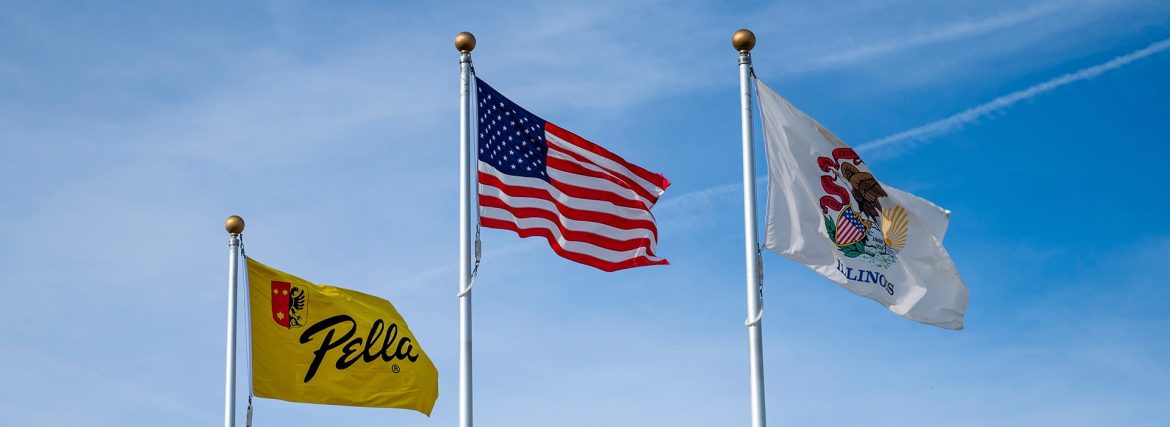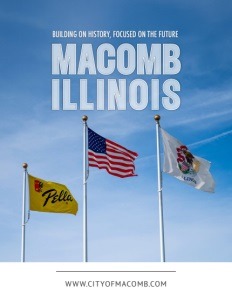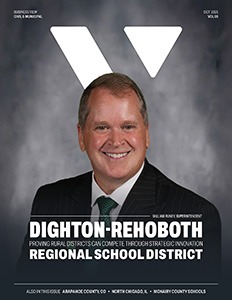Building on History, Focused on the Future
Focused on diversifying its economy while ensuring the infrastructure is up to par, this Illinois success story is firmly looking ahead
Shaped by decades of industry, education, and tradition, Macomb is a city welcoming progress while preserving all that makes it special. For more than 125 years, Western Illinois University has been part of its fabric, giving the city a strong academic identity.
Today, Macomb is broadening its horizons, diversifying its economy, investing in infrastructure, and embracing creative strategies to secure a bright future. For the 15,000 residents who call Macomb home, this translates into a community with a high quality of life and abundant opportunities.
A Legacy of Education
For more than a century, Western Illinois University has been an anchor of Macomb’s economy, shaping the city’s evolution. Mayor Michael Inman says the university thrived in the 1960s and 70s, with enrollment swelling to nearly 15,000 students at its peak. “Macomb was a bit of a boomtown,” he conveys.
Although enrollment has declined over the last ten years, the university is taking proactive steps to strengthen its future. An example is the $130 million Center for the Performing Arts currently under construction, the first new building on campus in more than 40 years.
“We believe that that’s going to be a driving force for the public, to view that this institution has a lot more years of life in it. Otherwise, why would the state be investing $130 million in a new building?” remarks Inman.
In addition, the city benefits from the presence of Spoon River College, who have just completed a $18 million campus in the city, reporting increases in enrollment due to the demand for skilled training. “Technical jobs, the manufacturing sector, are now well-paying jobs and often require a certification process, not a full degree program,” says Inman. “Those people are getting into the workforce much faster and at good paying jobs.”
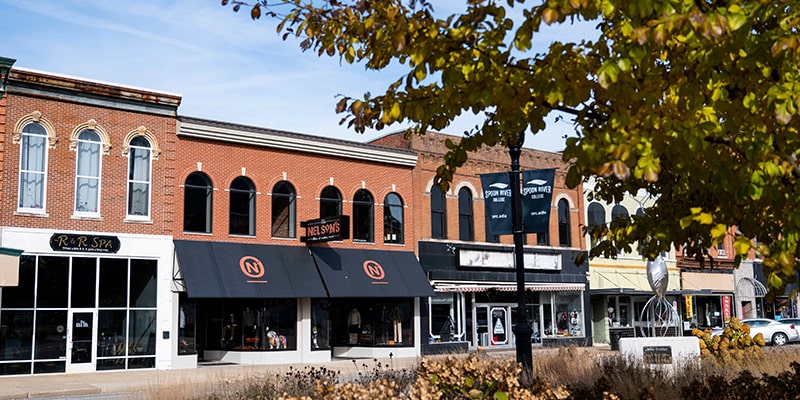
Strength in Manufacturing
While education has been a major economic driver in the city, Macomb has also cultivated a strong manufacturing base. NTN-Bower Corporation, formerly Federal-Mogul, has been part of Macomb since the 1960s. The company has invested heavily in its facility, including a $110 million expansion a decade ago. “They have a million square feet of production under their roof. Their biggest customers are John Deere and Caterpillar,” relays Inman. “With that expansion they brought some automotive component manufacturing here, and they’re selling those to Honda, Ford, Toyota.” Currently NTN-Bower employs 750 people, offering what Inman describes as, “good family wage earning jobs with benefits.”
Pella Windows is another Macomb success story, growing dramatically since it set up operations in the city 15 years ago. Inman recounts, “Macomb, Illinois was where they wanted to build a plant and invest in the community and employ people from this area.” Originally manufacturing wood window products for high end homes, Pella relocated their vinyl window manufacturing line from Kentucky, expanding from 170 to 650 jobs.
A Downtown Story
Macomb’s downtown showcases the unique history of the city, while also offering a glimpse into its exciting plans for the future. “We have a vision of retail development, niche boutique type outlets, mixed with service and banking on the first floor of many of our historic downtown buildings,” explains Inman. “We are also promoting, both with financial support and incentives, residential development on the second floor of many of those buildings.”
The city has invested over $6 million in state and federal grant money on infrastructure upgrades, including new sidewalks, street surfaces, and reconfigured parking. “We knew that we had some infrastructure issues, and that if we were going to ask people to partner with us, we should probably set the tone,” he adds. So far, the strategy is working. “We have a 90% plus occupancy rate for our business storefronts downtown, and we’re seeing more folks living on the square.”
The area also features an 1872 courthouse, which McDonough County invested $4 million to renovate, further enhancing the heart of the city. “That still acts as the county’s governmental seat where courtrooms are at, and it included a significant security enhancement for the building,” Inman reports. “But it really is a picturesque county courthouse in a picturesque downtown historic setting.”
The fact that Abraham Lincoln visited the city is another source of pride. Inman touts, “We’re part of the Abraham Lincoln National Heritage Area. We also have something that we’ve collaborated with at the state level, called Looking for Lincoln. And there’s a commemorative turnstile on the courthouse lawn that talks about the two times that Lincoln was here prior to him becoming the president.”
Elizabeth Magie is one more part of Macomb’s history, celebrated for her creation of ‘Landlord’s Game,’ which was purchased by Parker Brothers and renamed Monopoly. The recent installation of the largest Monopoly board in the world, complete with interactive QR-coded game cards, and giant stainless steel sculptures of the iconic game pieces, make visiting downtown Macomb an event not to miss. “One is a large pair of dice that actually spin on a pivot. They’re probably 20 feet in the air,” details Inman. “There’s a top hat and there’s a stainless steel statue of Elizabeth Magie. And then we have a large illuminated half Landlords Game half Monopoly on one corner of the downtown square that’s probably five feet square.”
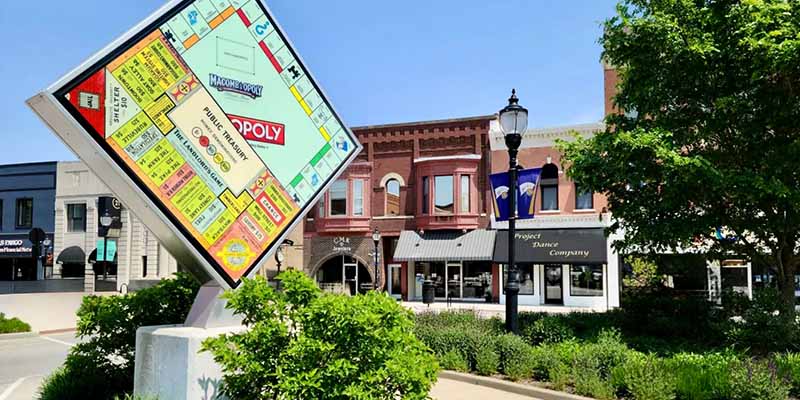
Investing in Housing and Infrastructure
Like many communities, Macomb is dealing with the challenges of aging infrastructure. The city has made considerable progress, including a $3.5 million upgrade to its wastewater treatment plant. “We’re fully compliant with all EPA rules and regulations regarding both our water and wastewater, but we’re undergoing some significant investments in both those,” Inman maintains. “These are things many folks don’t even know are playing in the background, but we’re building for the future, knowing that likely EPA guidelines are going to become more stringent in some specific areas that we treat and deal with here.”
The city is also moving away from reliance on Spring Lake, a century old surface water source, shifting to underground aquifers. The construction of a reverse osmosis facility is planned, with the intention of providing a reliable water source for decades to come. “We’ll be tapping into the Petersburg water aquifer, that’s literally billions and billions of gallons of water that are below the surface in this part of the United States,” he says.
“The proposed water treatment plant is a nearly $35 million dollar project and will likely be online in late 2027 or 2028. We are also investing in a new Solar Array that will provide the energy to power both our water and wastewater processes. We’re looking forward to that conversion that in the long term, should save a significant amount of tax dollars.”
When it comes to housing, high construction costs, interest rates, and material shortages have slowed new builds, but the city is exploring incentives such as property tax rebates to encourage development.
“Once we get some stability in those areas, I think we’re actually going to see some movement,” stresses Inman. “We have some platted subdivisions that still have the ability to yield a fair number of new home constructions. We have affluent subdivisions on the north side of town that have seen the most recent development, with new home in the $250,000-$400,000 range.”
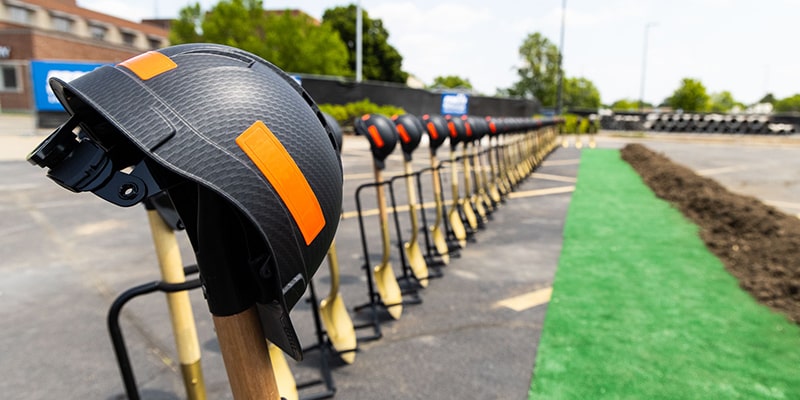
Affordable housing development is an ongoing priority, including starter homes and options for those looking to downsize. The availability of underutilized student rental properties, which are being renovated and repurposed, is one way Macomb is bringing new offerings to the market. The city has also seen investment in senior housing options. Wesley Village offers a continuum of care, including independent living, assisted living, and nursing facilities.
“They have a large apartment building, and it’s attached to the medical facility, but they also have duplex homes that are designed for folks that are still fully independent, who just need a smaller space,” Inman portrays. “That’s actually growing here, and that frees up existing housing for families who are looking for that move up.”
Looking Ahead
Moving forward Macomb’s focus remains on diversifying its economy. “We want to not only continue to support the university and be a host community, but we also want to diversify our local economy to take the opportunity to evolve, as well,” Mayor Inman emphasizes.
To create this shift, the city is evaluating a proposed $58 million project that will incorporate a youth sports facility that could host basketball, volleyball, soccer, and other tournaments as well as other non-sports related events.
“We can literally drive upwards of 2200 people here, about 40 weekends out of the year. I’ll take that, when their average spend is $144 per person per weekend they’re here, and that’s driving other business, retail, commercial development,” he asserts.
“We can have an indirect impact on the number of students who come to Western Illinois University to take advantage of the great academic offerings there, in addition, we can give people one more reason to come to live, learn and thrive in Macomb, IL.”
AT A GLANCE
Who: Macomb, Illinois
What: A vibrant city of 15,000 working to diversify and grow its economy
Where: McDonough County, Illinois
Website: www.cityofmacomb.com
PREFERRED VENDORS
Utopian Power, LLC : www.utopianpower.com
Founded in 2020 in Ann Arbor, Utopian Power delivers high-quality solar solutions that strengthen energy independence, drive economic growth, and protect the environment. Serving commercial, industrial, municipal, and utility clients, the company’s projects—from schools to utilities—reduce costs, cut emissions, and build stronger, cleaner, more resilient communities across the Midwest and beyond.
McDonough District Hospital : www.mdh.org
McDonough District Hospital (MDH) is proud to provide the Macomb community with a range of vital healthcare options, including pharmacy, primary care, general surgery, radiology, rehabilitative care, OBGYN, sports medicine, laboratory services, and more. From routine checkups to specialty treatments, we care for patients at every stage of life. Our 48-bed facility provides convenient access to high-quality care in a welcoming and comfortable atmosphere.
